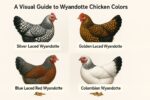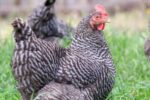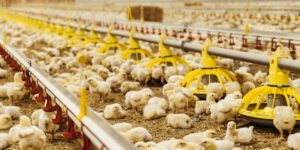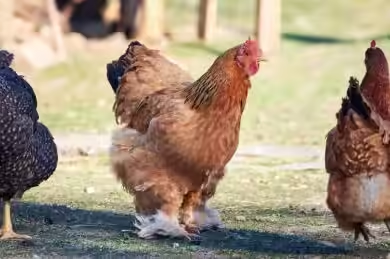Last updated on August 1, 2025
Raising broiler chicks is rewarding. But these birds grow incredibly fast. That rapid growth comes with unique health challenges. One sniffle or a bit of loose stool can quickly turn into a flock disaster. So, a smart plan for must-have medications for broiler chicks isn’t just good. It’s crucial for success.
I’ve been there. One season, I thought I could cut corners on my medication budget. Within a week, a few coughs turned into an entire shed of wheezing birds. My profits went right out the window. Since then, I’ve learned proactive health management is non-negotiable. This includes strategic medication use. This guide isn’t about pushing drugs. It’s about empowering you, the farmer. We want to help you keep your flock healthy, productive, and profitable.
Understanding Common Health Challenges in Broiler Chicks
Broiler chicks are vulnerable. Their accelerated growth puts stress on their systems. Add in potential stressors like variable temperatures, crowded conditions, or even just the move from hatchery to brooder. You’ve got a recipe for health issues. What are we usually up against?




We’re often battling things like:
- Coccidiosis: A nasty parasitic disease. It damages the gut lining. This leads to bloody droppings, poor nutrient absorption, and high mortality. Trust me, it’s almost always lurking. Global estimates suggest this disease alone costs poultry over $2 billion annually. This is true even without counting subclinical cases. Some regional studies (e.g., in Nigeria and Ethiopia) report prevalence rates in broiler flocks exceeding 60%.
- Bacterial Infections: Respiratory issues (like Chronic Respiratory Disease, or CRD), enteritis, and bacterial joint problems are common. These can spread fast. Recent research (e.g., a November 2024 study) highlights how respiratory illnesses sharply reduce appetite. They also divert energy from growth. This leads to significant weight loss and slowed development – directly impacting your bottom line.
- Stress: Any change can stress chicks. This makes them susceptible to illness. Vaccination, temperature fluctuations, or a sudden feed change can trigger it.
- Vitamin Deficiencies: Rapid growth demands many nutrients. If chicks don’t get enough, they show signs of deficiency. This impacts growth and immunity. You’ll often see poor feathering or general lethargy.
- Viral Diseases: Newcastle Disease and Infectious Bursal Disease (Gumboro) can wipe out a flock quickly if not prevented. There’s no cure for these. Prevention is your only option.
Prevention beats cure every single time. It’s less costly, less stressful, and far less heartbreaking. For more on preventing early chick mortality, check our guide on Top 10 Reasons Day-Old Chicks Die Early.
The “Must-Have” Medications for Your Broiler Chicks: A Comprehensive Guide
Now, let’s talk brass tacks. This guide covers essential medications. Remember, it’s not a substitute for professional veterinary advice. Always consult a qualified poultry veterinarian for specific diagnoses and treatment plans, especially during a severe outbreak. Think of these as your first line of defense. They are essential tools in your broiler health arsenal. If you’re curious how broilers stack up against other breeds, our Noiler Chicken vs. Broiler Chicken article offers a great comparison.
Medication 1: Amprolium (Anticoccidial)
Amprolium is an anticoccidial medication. It’s used to prevent and treat coccidiosis in broiler chicks. Its widespread prevalence and significant economic impact make effective coccidiosis management crucial. This medication interferes with the coccidia parasite’s thiamine (Vitamin B1) metabolism. It effectively stops its life cycle. This prevents widespread gut damage. It’s an absolute non-negotiable for most broiler operations.



What it is & Its Category:
| Attribute | Detail |
|---|---|
| Name | Amprolium |
| Category/Type | Anticoccidial. Designed specifically to combat coccidia protozoa, not an antibiotic. |
| (Common Brand Names) | Amprol, Corid, Amprocox |
| (Active Ingredient) | Amprolium hydrochloride |
Why it’s Essential: Addressing Coccidiosis
| Attribute | Detail |
|---|---|
| Condition/Benefit | Coccidiosis. This is arguably the most common and damaging disease for broiler chicks. |
| Type of Problem | Parasitic disease. Coccidia parasites destroy intestinal cells, preventing nutrient absorption. |
| Key Symptoms | Bloody or orange-tinted droppings, sudden deaths, birds huddled together, ruffled feathers, and poor growth despite good feed. |
| Purpose | Primarily for prevention during crucial early weeks; can also be used for treatment during an outbreak. |
How to Administer:
| Attribute | Detail |
|---|---|
| Recommended Dosage | Varies by concentration (e.g., 9.6% solution). Common preventative dose: 1 teaspoon per gallon of drinking water. Follow product label. |
| Administration Method | Almost exclusively in drinking water, ensuring all birds get access. |
| Duration of Use | Prevention: 5-7 consecutive days (starter phase). Treatment: 5-7 days or longer, under veterinary guidance. |
| Target Chick Age/Stage | Crucial during the first 1-4 weeks of life when chicks are highly vulnerable. |
| Frequency | Provide freshly mixed medicated water daily. |
Critical Considerations & Warnings:
| Attribute | Detail |
|---|---|
| Withdrawal Period | Many Amprolium products have a 0-day withdrawal period for broilers when used at recommended levels. This means you can process birds immediately after treatment. However, always verify the specific product label you are using. This is paramount for food safety. |
| Potential Side Effects | Generally safe at correct dosages. High, prolonged doses can interfere with thiamine (Vitamin B1) absorption; some farmers supplement B vitamins post-treatment. |
| Storage Instructions | Store in a cool, dry place, away from direct sunlight, and out of reach of children and animals. |
| Contraindications/Precautions | Do not mix with other coccidiostats unless advised by a vet. Ensure continuous access to medicated water and no other water sources. |
Medication 2: Tylosin (Broad-Spectrum Antibiotic for Respiratory Issues)
Tylosin is a broad-spectrum antibiotic. It treats bacterial respiratory infections in broiler chicks, particularly those caused by Mycoplasma (CRD). Respiratory issues can sweep through a broiler flock incredibly fast. Sometimes, you don’t even realize what’s happening until it’s too late. These diseases cause discomfort. They also sharply reduce appetite. They divert energy from growth. This leads to significant weight loss and slowed development. That’s where an effective antibiotic like Tylosin comes into play. Having Tylosin on hand means you can act quickly. Be ready when you spot those first coughs or sneezes.
What it is & Its Category:
| Attribute | Detail |
|---|---|
| Name | Tylosin |
| Category/Type | Macrolide antibiotic. Effective against Gram-positive bacteria and Mycoplasma (causes CRD). |
| (Common Brand Names) | Tylan |
Why it’s Essential: Addressing Chronic Respiratory Disease (CRD) & Other Bacterial Infections
| Attribute | Detail |
|---|---|
| Condition/Benefit | CRD (Mycoplasmosis), Infectious Coryza, other bacterial enteritis. Respiratory issues are notorious. |
| Type of Problem | Bacterial infection, often exacerbated by stress or poor ventilation. |
| Key Symptoms | Coughing, sneezing, snicking (short, dry cough), watery eyes, nasal discharge, swollen sinuses, reduced feed intake, poor growth. |
| Purpose | Treatment of active bacterial infections, particularly respiratory ones. |
How to Administer:
| Attribute | Detail |
|---|---|
| Recommended Dosage | Varies significantly by product concentration and infection severity. Typically administered as soluble powder in drinking water. Follow product instructions precisely. |
| Administration Method | Primarily in drinking water. |
| Duration of Use | Usually 3-5 days, or as directed by a veterinarian. Complete the full course even if symptoms improve. |
| Target Chick Age/Stage | Can be used at any age when bacterial infections are present, but CRD often surfaces during later starter or grower phases. |
| Frequency | Administer daily, ensuring fresh solution. |
Critical Considerations & Warnings:
| Attribute | Detail |
|---|---|
| Withdrawal Period | Tylosin always has a withdrawal period. Typically 1-5 days (e.g., 3 days) before slaughter. You absolutely must respect this to avoid antibiotic residues in meat. |
| Potential Side Effects | Generally well-tolerated. |
| Storage Instructions | Store in a cool, dry place, protected from moisture. |
| Contraindications/Precautions | Emphasize responsible antibiotic use. Only use when a bacterial infection is suspected or diagnosed. Overuse contributes to antibiotic resistance. Never use for viral infections. |
Medication 3: Multivitamin Supplement (e.g., Vitamin AD3E + B Complex)
A high-quality multivitamin supplement, like Vitamin AD3E + B Complex, is an indispensable tool. It supports broiler chick health. While not a “medication” in the traditional sense, it gives your chicks a natural boost. This helps them cope with rapid growth demands and environmental stressors. These supplements aren’t just about preventing deficiencies. They actively support immune function. They also help birds recover quicker after stressful events like transportation or vaccination.
What it is & Its Category:
| Attribute | Detail |
|---|---|
| Name | Comprehensive multivitamin blend (e.g., Vitamins A, D3, E, and B-complex). |
| Category/Type | Nutritional supplement. |
Why it’s Essential: Stress Relief, Growth, Immunity & Deficiency Prevention
| Attribute | Detail |
|---|---|
| Condition/Benefit | Non-specific stress, compromised immunity, nutritional deficiencies, support during rapid growth, recovery from illness or vaccination. |
| Type of Problem | Nutritional/Physiological support. |
| Key Symptoms | Lethargy, poor appetite, stunted growth, poor feathering, general unthriftiness, especially after a stressful event. |
| Purpose | Proactive support, not a cure for disease. Boosts overall vitality. |
How to Administer:
| Attribute | Detail |
|---|---|
| Recommended Dosage | Varies by concentration. Typically a few grams or ml per gallon of drinking water. Follow product labels. |
| Administration Method | Most commonly in drinking water; some are available as feed additives. |
| Duration of Use | Often 3-5 days during stressful periods (chick arrival, vaccination, feed changes, heat stress) or periodically for general health. |
| Target Chick Age/Stage | Beneficial at all stages, especially during initial brooding and growth spurts. |
| Frequency | Daily for the specified period. |
Critical Considerations & Warnings:
| Attribute | Detail |
|---|---|
| Withdrawal Period | Typically no withdrawal period as these are nutritional supplements. |
| Potential Side Effects | Highly unlikely at recommended doses. |
| Storage Instructions | Keep in a cool, dry place, sealed tightly to prevent degradation. |
| Contraindications/Precautions | Ensure water lines are clean after use (some vitamin solutions can leave residue). Do not over-supplement, as excessive fat-soluble vitamins (A, D, E, K) can be toxic. |
Medication 4: Newcastle Disease Vaccine (Live or Inactivated)
Newcastle Disease Vaccine (NDV) is a crucial viral vaccine. It protects broiler chicks from Newcastle Disease. This one isn’t a “cure”; it’s a shield. Newcastle Disease is a terrifying opponent for any poultry farmer. It’s highly contagious. It spreads like wildfire. It can devastate a flock with high mortality and severe neurological symptoms. Vaccination is your only real defense. Investing in a proper vaccination program for Newcastle Disease is one of the smartest decisions you can make. It protects your birds and your investment.
What it is & Its Category:
| Attribute | Detail |
|---|---|
| Name | Newcastle Disease Vaccine (NDV). |
| Category/Type | Viral vaccine, either live attenuated or inactivated (killed). |
Why it’s Essential: Protecting Against Newcastle Disease (ND)
| Attribute | Detail |
|---|---|
| Condition/Benefit | Newcastle Disease. |
| Type of Problem | Highly contagious and often fatal viral disease. |
| Key Symptoms | Respiratory (gasping, coughing), nervous (tremors, paralysis, twisted neck), digestive (diarrhea), and high mortality. |
| Purpose | Prevention – provides immunity to protect birds from infection. |
How to Administer:
| Attribute | Detail |
|---|---|
| Recommended Dosage | One dose per bird, as per manufacturer’s instructions. |
| Administration Method | Common methods include eye drop, drinking water, coarse spray, or injection (depending on vaccine type and age). |
| Duration of Use | A single application provides immunity for a period. Broilers usually require one or two doses during their lifespan. |
| Target Chick Age/Stage | Often given at Day 1-7 for the first dose, with a booster around Day 14-21 if needed. |
| Frequency | Follow a strict vaccination schedule recommended by your vet or regional poultry authorities. |
Critical Considerations & Warnings:
| Attribute | Detail |
|---|---|
| Withdrawal Period | No withdrawal period for vaccines. |
| Potential Side Effects | Mild post-vaccination reactions (e.g., slight sniffles) can occur but are usually transient. |
| Storage Instructions | Vaccines are highly sensitive. Store exactly as directed (usually refrigerated or frozen) and protect from light and heat. Discard opened vials promptly. |
| Contraindications/Precautions | Vaccinate only healthy birds. Use clean, non-chlorinated water if administering via drinking water. Ensure proper handling to maintain vaccine viability. Accidental human exposure to live vaccines should be reported to a doctor. |
General Best Practices for Medication Management and Broiler Health
Having the right medications is only half the battle. How you manage them and your overall farm hygiene makes all the difference. For further insights on overall farm management, consider reading our post on Mistakes That Make Noiler Farmers Lose Money and How to Avoid Them.




Biosecurity Measures
This is your strongest defense against disease. Think of biosecurity as a fortress around your farm. It’s a set of management and physical measures. They’re designed to reduce the risk of disease introduction and spread. Recent meta-analyses (e.g., from November 2024) confirm that inadequate biosecurity is a major risk factor for disease outbreaks. It significantly increases the likelihood of issues like coccidiosis and avian influenza. Without appropriate biosecurity, no single disease prevention program will succeed. In North America alone, the combined economic impact of preventable diseases and related issues due to poor biosecurity is estimated to be over $4.7 billion annually (as of December 2024 data).
It includes:
- Restricting Access: Limit who enters your poultry houses. My rule is simple: if you don’t absolutely need to be in the shed, stay out.
- Foot Dips and Disinfection: Using disinfectant foot dips at entry points and regularly disinfecting equipment. This simple step can dramatically reduce pathogen entry.
- Sanitation: Thoroughly cleaning and disinfecting houses between flocks. Leaving behind pathogens from a previous flock is like leaving a welcome mat for disease for the next batch.
- Isolation of Sick Birds: Immediately separate any sick-looking birds. This prevents disease spread. If you see one bird showing symptoms, assume others are exposed. “Prevention is better than cure” isn’t just a saying; it’s your most profitable strategy. For more on natural health strategies, see Forget Drugs: How to Keep Your Noilers Naturally Healthy & Profitable.
Proper Administration Techniques
Even the best medication is useless if administered incorrectly.
- Accurate Measurement and Mixing: Use proper measuring tools. Don’t eyeball it. Too little is ineffective. Too much could be harmful or wasteful. Imagine trying to bake a cake without measuring cups; the results would be disastrous, and it’s the same with meds.
- Ensuring Even Distribution: For water-soluble medications, make sure the product dissolves completely. Also ensure that all birds can access the medicated water. This might mean adjusting the number of drinkers or stirring frequently. Pro Tip: I always mark my medicated water buckets with a specific color or label to avoid any accidental mix-ups with plain water.
- Clean Water/Feed Sources: Medication won’t work well if birds are drinking from dirty waterers or eating contaminated feed. Cleanliness amplifies effectiveness.
- Monitoring Consumption: Watch your birds. Are they drinking the medicated water? If not, troubleshoot. Sometimes, a change in water taste from medication can reduce intake. This makes the treatment ineffective.
Record Keeping
This is often overlooked but incredibly valuable. Keep a simple logbook (or even a spreadsheet).




- What to Record: Date of administration, medication name, dosage, batch number, bird age, observed effects, and the reason for treatment.
- Why it Matters: Record keeping helps you track effectiveness. It helps identify recurring problems. It also ensures compliance with regulations. This practice helps you make informed decisions for future flocks. It’s your farm’s health history, allowing you to spot trends. For instance, last season my records showed a coccidiosis flare-up always hit around week 3. Now I know exactly when to start preventative Amprolium.
When to Consult a Veterinarian
While you’re building expertise, knowing your limits is smart farming. Don’t be tempted to play “Dr. Google” forever when things get serious.
- Persistent Symptoms: If birds aren’t responding to initial treatment after a couple of days, something else might be going on.
- Widespread Illness: If a significant number of birds are suddenly getting sick, that’s a red flag demanding professional attention.
- Unclear Diagnosis: When you’re not sure what’s going on, or the symptoms are unusual. A vet has diagnostic tools you don’t.
- Importance of Professional Diagnosis and Prescription: A vet can conduct lab tests, confirm diagnoses, and prescribe appropriate treatments. This often saves you money and birds in the long run. They can distinguish between, say, a viral cough and a bacterial one, which changes everything.
Frequently Asked Questions (FAQ)
What are the most common diseases in broiler chicks?
The most common diseases battled by broiler chicks include Coccidiosis (a parasitic disease), various Bacterial Infections (like CRD and enteritis), and Viral Diseases (such as Newcastle Disease and Gumboro). Stress and vitamin deficiencies can also lead to health issues.
Why is coccidiosis such a big problem for broilers?
Coccidiosis is a major problem because it’s a highly prevalent parasitic disease that directly damages the gut lining. This leads to poor nutrient absorption, stunted growth, and can result in high mortality, causing significant economic losses for farmers.
Do all broiler medications have a withdrawal period?
No, not all broiler medications have a withdrawal period. Nutritional supplements and vaccines typically do not require a withdrawal period. However, antibiotics like Tylosin always have a withdrawal period that must be strictly observed to ensure food safety.

 Watermelon Pest and Diseases Treatment – How Do You Treat Watermelon Disease? →
Watermelon Pest and Diseases Treatment – How Do You Treat Watermelon Disease? →


Can I use antibiotics for viral infections?
No, antibiotics are only effective against bacterial infections. They will not treat viral diseases. Using antibiotics unnecessarily can lead to antibiotic resistance, making them less effective when truly needed.
Why is record keeping important for medication use?
Record keeping is vital for tracking medication effectiveness, identifying recurring health patterns in your flock, ensuring compliance with regulations, and making informed decisions for future poultry cycles. It helps you build a detailed health history for your farm.
When should I call a vet?
You should call a veterinarian if you observe persistent symptoms that don’t respond to initial treatment, if there’s widespread illness in your flock, or if you have an unclear diagnosis. Professional veterinary advice is crucial for accurate diagnosis and effective treatment plans.
Quick Reference Chart: Essential Broiler Chick Medications
Here’s a quick summary of the “must-have” medications, their primary uses, and the most critical caution to remember for fast farm-side lookup.



| Medication | Primary Purpose | Key Caution (Withdrawal Period / Important Note) |
|---|---|---|
| Amprolium | Prevents/Treats Coccidiosis | 0-day withdrawal period (verify product label) |
| Tylosin | Treats bacterial respiratory infections (e.g., CRD) | Always has a withdrawal period (e.g., 1-5 days) |
| Multivitamin | Stress relief, growth, immunity support | No withdrawal period; avoid over-supplementation |
| Newcastle Disease Vaccine | Prevents Newcastle Disease (viral) | No withdrawal period; critical cold chain storage |
Conclusion: Ensuring a Healthy and Productive Broiler Flock
Navigating the world of must-have medications for broiler chicks might seem daunting at first. However, with the right knowledge and a proactive mindset, you’re well on your way to success. By understanding common challenges, and strategically using essential medications, you build a foundation for robust health. Adhering to strict biosecurity and administration practices means you’re not just treating symptoms; you’re building for maximum productivity.
Remember, every healthy chick is a step towards a more profitable and satisfying farming experience. Stay vigilant. Keep learning. Never hesitate to seek expert advice. Your broiler chicks — and your bottom line — will thank you. For more advice on farm profitability, explore our articles on 7 Ways to Boost Profitability in Your Noiler Chicken Farm and Is Noiler Chicken Profitable in Nigeria?. If you’re interested in alternative breeds, we also have resources on How to Start Noiler Chicken Farming with Just 10 Birds, 9 Powerful Advantages of Raising Dual-Purpose Noiler Chickens, How to Make Noiler Grow Fast, and Disadvantages of Noiler Chicken.


